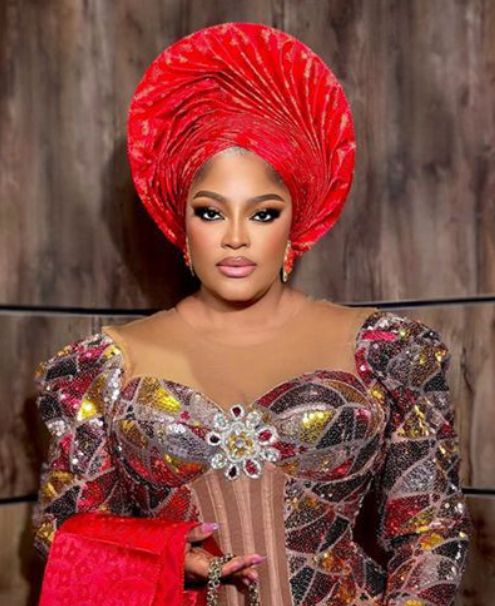
Money Can’t Buy Taste: Omoborty Fires Back at Wedding Comparisons

Nollywood actress Biodun Okeowo, popularly known as Omoborty, has spoken out passionately against the constant comparisons of weddings based on extravagance, cost, and perceived class. In a society where social media has become a stage for display and judgment, weddings have become one of the most targeted events for comparison, with people measuring love stories against how much was spent, how decorated the hall looked, or how many celebrities were in attendance. But Omoborty’s outburst has hit differently, striking a chord with many who believe that the real meaning of weddings and marriages is being lost in the rush to show off. According to her, rich or poor, people deserve to celebrate their special day in their own unique style without being subjected to the unending cycle of mockery and comparison from outsiders.
Her words were bold, sharp, and unapologetic: “Money can decorate a hall, but it can’t decorate marriage. So let’s stop confusing money with taste. They are not the same thing. The level of a wedding doesn’t equate the success of the marriage.” With this, Omoborty dismantled the widespread assumption that the bigger the wedding, the happier or more successful the couple will be. In her view, people have become so obsessed with show and ratings that they have forgotten the very essence of matrimony.
Omoborty pointed out that wealth or lack of it has nothing to do with whether someone has good taste or not. A person may choose to have an intimate, low-key wedding simply because they prefer simplicity, not because they are broke. On the other hand, someone else may decide to spend millions on a flamboyant ceremony, not necessarily because they have so much money to throw away, but because that is their style. The actress stressed that personality should dictate how a wedding is planned, not societal pressure or the desire to earn validation from strangers on social media.
In her words, “Some like it simple, some extravagant, some in between. A party does not prove riches, it reflects personality. Rich or poor, people have the right to celebrate in their own style. Comparing weddings and arguing whose is better is childish. What exactly are you people going to do with the ratings?” This rhetorical question has lingered across online spaces, forcing many to reflect on why people feel entitled to judge how others choose to celebrate their big day.
The Nollywood star further highlighted that people often confuse a lavish wedding for wealth when in fact some couples borrow heavily or go into debt just to achieve the “dream wedding” they have imagined. For many, that debt becomes the first stumbling block of their marital journey, putting unnecessary financial pressure on a union that has barely begun. On the flip side, an intimate wedding may be funded with ease, allowing the couple to start their marriage free of unnecessary burdens. Omoborty believes that outsiders have no business in making such judgments, because at the end of the day, it is the couple’s marriage, not the spectators’, that will endure.
Her statement reflects the reality of the modern Nigerian wedding scene, where lavish displays have become a trend. Weddings now often double as status exhibitions, complete with designer outfits, destination photo shoots, celebrity MCs, and hall decorations that look like scenes out of a fairytale. Social media amplifies this culture, as pictures and videos of such weddings trend for days, with people dissecting every detail—from the bride’s dress to the food served and even the caliber of guests in attendance. Unfortunately, in the process, smaller weddings are often ridiculed, painted as “poor” or “low budget,” even when the couple themselves are satisfied with their celebration.
Omoborty’s frustration with the culture of comparison is not unfounded. Many couples have admitted to feeling pressured to spend beyond their means because of fear of being mocked by family, friends, and online critics. The actress condemned this unhealthy cycle, insisting that marriage should be about the couple’s happiness, not outsiders’ opinions. “Marriage for most happens once, so the wedding should be the couple’s dream, done in whatever way they choose, without outsiders having any right to water down their joy or make comparisons,” she said.
Her message quickly went viral, resonating with everyday Nigerians who feel weighed down by the endless expectations attached to weddings. One online commenter noted that Omoborty’s words were timely, saying, “It’s true. People don’t care about the couple; they only care about how much they can gossip. At the end of the day, a big wedding doesn’t guarantee peace in the home.” Another added, “If you like, spend 100 million on your wedding. If the marriage is built on lies and pride, it will crumble. But people don’t get that.”
Indeed, the actress’s words are not just about weddings; they are a reflection of a deeper societal problem where materialism overshadows true values. The obsession with appearances has infiltrated not just marriages, but nearly every aspect of life, from birthday parties to burial ceremonies. People are quick to judge based on surface-level displays without caring about what lies beneath. Omoborty’s outcry is therefore a call for society to refocus on the real essence of things, in this case, the true meaning of marriage, which is love, companionship, and partnership—not decorations and grandiose banquets.
What stood out most from her statement was her final plea: “Comparison truly irks me. People need to stop abeg!!!” It was an emotional outburst that summarized the weight of frustration many others share but may not have voiced. For Omoborty, this is not just about defending herself or any celebrity; it is about protecting the integrity of marriage as a sacred bond that should not be reduced to a competition of who spent more.
In a world that is increasingly dominated by social media trends and the pressure to “outshine” others, Omoborty’s stand is refreshing. She reminds everyone that weddings are deeply personal and should be respected as such. Whether a couple chooses to host a backyard party with close family or a star-studded event in a five-star hotel, the only thing that truly matters is their joy and the foundation of love on which they are building their new life. Society’s obsession with ranking and comparing weddings is, as she put it, childish and unnecessary.
For many Nigerians and indeed people across the world, her message is a timely reminder that money is not the true measure of taste, class, or happiness. A decorated hall may impress for a day, but it is the strength of the marriage that will last a lifetime. And no matter how elaborate or simple the ceremony, the couple should be allowed to celebrate in peace, free from judgment, gossip, or comparisons.


